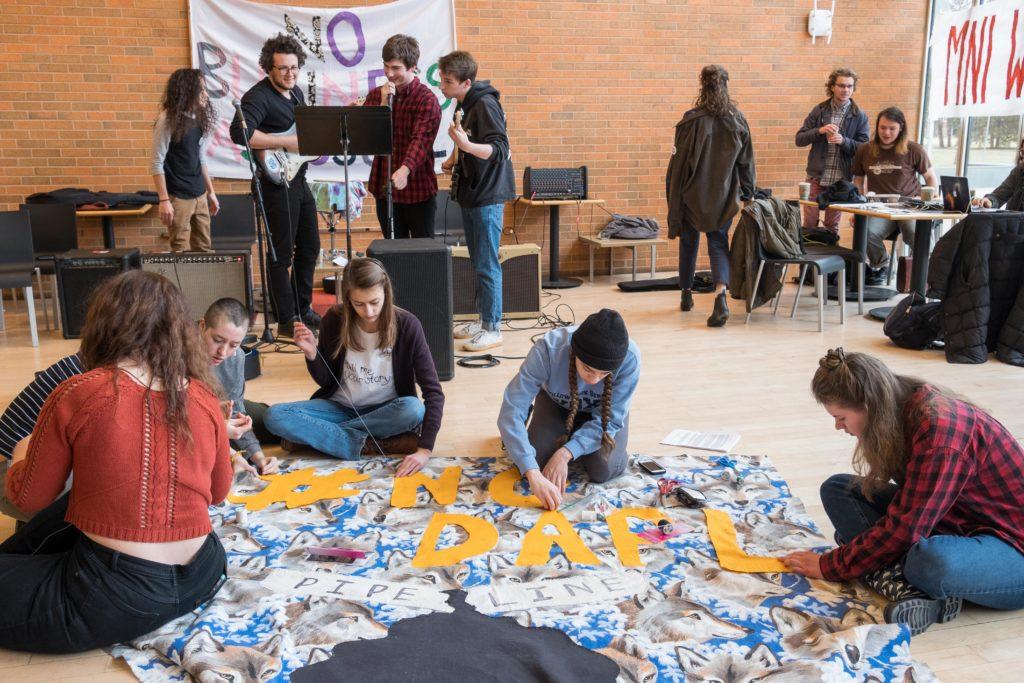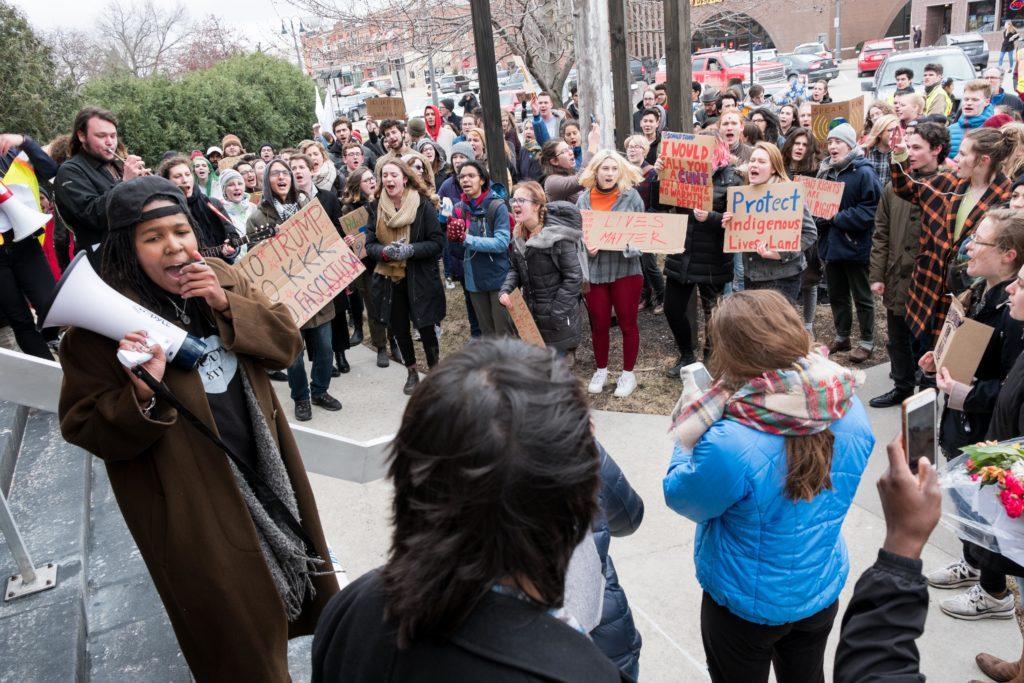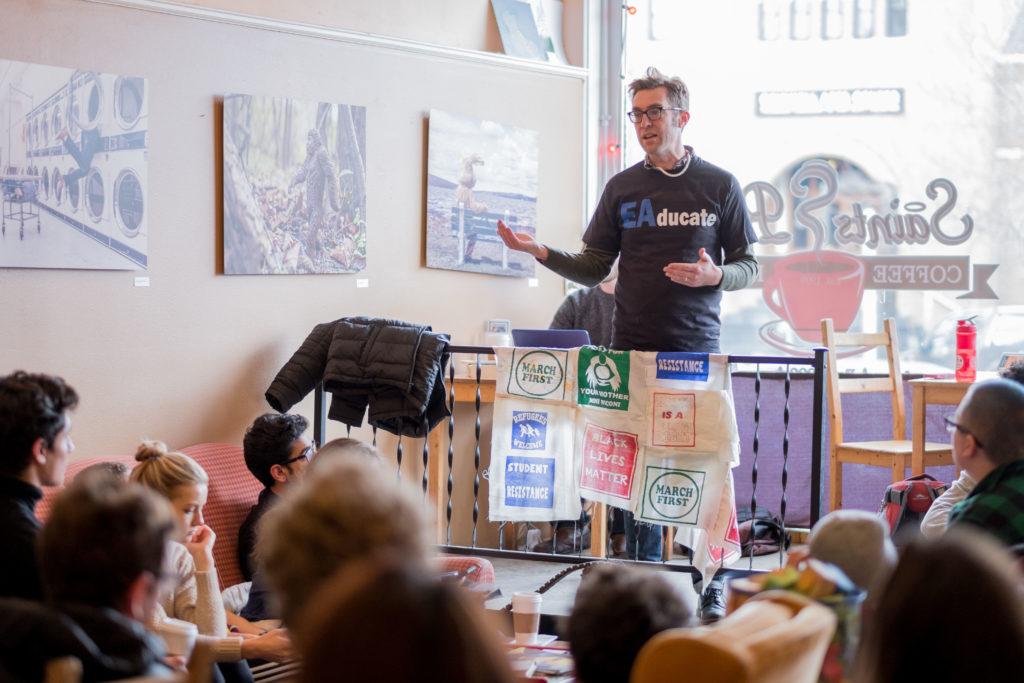
March 1st: Day of Student Resistance, originally conceived of by members of Rise Grinnell and the Occupy 8th Avenue movement, was planned as a response to the Trump administration and the expressions of bigotry that have ensued within the public and the White House following Trump’s election. On March 1, students marched, participated in a direct action targeting Wells Fargo for its investment in fossil fuels and attended a series of discussions and teach-ins throughout the day.
Students convened in the Grill at 11 a.m. to paint banners and discuss the relationship between activism and art; music and and the rumble of animated conversation were audible from the second floor of the JRC.
Hazel Batrezchavez ’17, one of the student organizers, spoke in the Grill on the importance of incorporating art into activism, and activism into art. “Art [alone] doesn’t function as a form of activism. But we started with this activity first to build a community, to start making these small interactions with each other because that’s the only way that we can stand together and fight against all of what we need to fight against and to fight for everything we need to fight and march for.”
The day continued as protesters—mostly members of the Grinnell Campus community—filed from the Grill onto the steps in front of the JRC for a rally and briefing on the ensuing direct action. Students took turns explaining their involvement in the demonstration to the crowd of about 100. Deqa Aden ’18 described her experience with massive student demonstrations in Somaliland, and called on students at Grinnell College to follow suit.
Before marching into downtown Grinnell, student organizer Simonne Carlton ’18, cautioned students to keep the event peaceful.
“Note that no one is risking arrest at this event — not today, anyway. Today is about love and compassion, and we expect the protest to remain non-violent,” they said.
Students marched along 8th Ave. and then down Park St. before picketing the sidewalk in front of Wells Fargo bank. The crowd marched single file up and down the sidewalk, chanting “this is what democracy looks like,” singing “This Land is Your Land,” and listening to speakers who stood in front of the Wells Fargo with a megaphone, denouncing the bank’s investment in the Dakota Access Pipeline.

In a joint effort by faculty and students, the March 1st actions following the anti-DAPL demonstration at Wells Fargo took the form of teach-ins and discussions. Topics covered in the teach-ins ranged from the global and historical to the local: Professor Timothy Dobe, religious studies, and Activist Raphael Mimoun spoke on the process by which individuals connect with activist movements; Professors Ross Haenfler, sociology, and Professor Joshua Ramey, philosophy, spoke on the anthropological significance of “honor cults” in perpetuating harmful white masculinities; Professor Jonathan Andelson ’70, anthropology, spoke of his experience with student activism during his time at Grinnell and Professor Kesho Scott, sociology, spoke of the historic role of activism by students in the U.S. and at Grinnell College over the past fifty years.

Ramey, who spoke to over 50 students in Faulconer Gallery during his teach-in on Wednesday, commented that “the fight for honor and prestige, the fight for competitive advantage in the market, is the only way to survive, whereas in earlier cultural moments it was possible to survive without dominating others through economic competition.” Of his role as an activist, Ramey said that “since the 2008 financial crisis, I’ve become utterly convinced that unless people band together to create a different economic future than global capitalism, that the planet and our social lives can’t sustain this level of degradation and toxic exploitation anymore.”
In an email to the organizers of the event, Scott wrote that her decision to take part in the action was informed by both the significance of student activism in creating change and also the mission of the College. “As a teaching college whose primary duty and desire is to make students critical and informed thinkers, I am supporting the efforts of March 1st because I think it is an opportunity for students/citizens/workers to practice what is learned. I believe a key to being global citizens is also being a global participant in whatever local we find ourselves.”
Scott, who spoke to a packed Spencer Grill at 3 p.m. on Wednesday, cancelled a class to participate in the event, reflecting the organizers’ goal to interrupt business as usual on campus.
Student organizers Taylor Burton ’18, Morgane Garnier ’19, and Naomi Runder ’19 said that they intended for the event to disrupt daily activities at the College, and emphasized the importance of a strike from the classroom. “We [will] disrupt business as usual, which is why we aren’t attending class. We’re making a sacrifice so that we can make a statement for our community, that we do not accept what is going on in the Trump administration. And we can’t treat every day like a normal day, because none of this is normal,” Burton said.
The other goal of March 1st, she said, was “to start a coalition between groups and students on campus, with members of the community and with schools in the US.”




































































